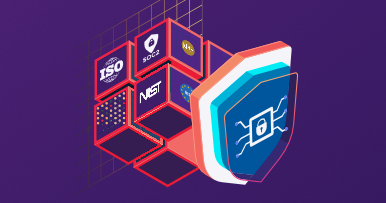How Small Businesses Can Leverage Security & Privacy Frameworks to Scale

Ritika Jain
Nov 05, 2024


As businesses scale, their security and compliance needs grow accordingly. This is especially true for startups and SMBs that experience rapid expansion. The frameworks that may have worked when the business was small and locally focused can become insufficient as it expands into new markets.
While standard frameworks like SOC 2 and ISO 27001 can provide a good starting point, these growing businesses might eventually need to go beyond these foundations to demonstrate their commitment, safeguard sensitive information, and unlock new business opportunities.
Why Frameworks are Essential to Your Security and Compliance Posture?
A data breach or security incident can have catastrophic consequences, from losing customer trust to hefty legal penalties and severe revenue loss. Security and privacy frameworks are foundational for maintaining a solid defense against modern business risks and a business enabler. Compliance with frameworks can help to -
- Gain confidence and earn people’s trust - SOC 2, ISO 27001, GDPR, PCI DSS frameworks, and more provide a comprehensive set of best practices, guidelines, and controls for startups and SMBs to develop a tailored security and compliance program. These frameworks ensure that your security and compliance measures are comprehensive, effective, and aligned with industry standards. This confidence is crucial for businesses to scale and earn people’s trust.
- Enhanced reputation and competitive advantage - Implementing these frameworks protects sensitive information and enhances an organization's reputation. A strong commitment to security and privacy can differentiate a company from its competitors and create more opportunities for collaboration with larger, regulated enterprises.
5 Best Practices to Implement Frameworks Effectively
1. Understand Your Unique Needs: Before selecting a framework, conducting a thorough risk assessment is crucial. Identify the threats most relevant to your business and ensure the framework you choose aligns with these risks, your business goals, and your growth trajectory. Additionally, consider the geographic and industry-specific regulations that apply to your business. For example, startups operating in the EU region must comply with GDPR, while financial services in the US may need to meet NYDFS cybersecurity regulations.
2. Establish SMART Goals: Once you've selected the appropriate security and privacy frameworks, set SMART (Specific, Measurable, Achievable, Relevant, and Time-bound) goals. These should align with your overall business strategy and regulatory requirements. For instance, a goal could be achieving SOC 2 or ISO 27001 certification within the next 15 months.
3. Involve Key Stakeholders: Engaging stakeholders-employees, executives, and board members is vital for successful implementation. Employees contribute practical insights into daily operations, while executives ensure alignment with long-term goals and secure the necessary funding. Engaging these diverse perspectives ensures that the selected framework is comprehensive, feasible, and well-supported throughout the organization.
4. Allocate Resources Effectively: Implementing a security and privacy framework requires time, personnel, and technology. Startups and SMBs may need to hire dedicated staff or invest in new technology to manage framework implementation and maintenance. Additionally, allocating resources for employee training, continuous monitoring, and external audits will ensure the framework remains effective over time.
5. Monitor and Improve Continuously: Implementing a framework is a time-consuming process. Continuous monitoring and evaluation are crucial to ensure the framework's effectiveness, identify areas for improvement, and adjust as necessary to meet evolving regulatory needs. Regular internal and external audits help ensure that the framework addresses current risks and remains aligned with business objectives.
Conclusion
As your company scales into new markets and industries, building a custom framework or enhancing existing controls can be the key to differentiating your business from competitors and ensuring long-term success. However, it can be time-consuming and costly.
With letsbloom, you can scale your compliance without added costs. Our Compliance automation software empowers you to easily and quickly build custom frameworks and controls, allowing you to respond promptly to changing regulatory requirements and manage entire compliance program in one central solution.
Looking to scale your business with SOC 2 or ISO 27001 compliance? Reach out to us now!










